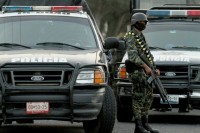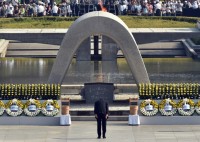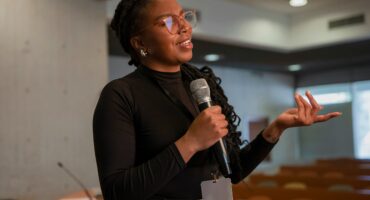Church Street bombing remembered
A remembrance for the Church Street bombing was held on Friday.

A part of WF Nkomo Street was closed on Friday for a small ceremony to remember a lethal blast at the spot in 1983.
Fourteen spectators and four speakers gathered to pay tribute to 19 people killed and 217 injured in the Church Street (now WF Nkomo) bombing.
The blast was outside Nedbank Square building at the height of the struggle against apartheid on 20 May, targeting SA Air Force offices.
Wessel Basson, of the National Conservative Party, led the speakers and placed a small, white coffin that held six flags next to the spot where the bomb went off.
Zirk Jansen, a survivor, said he was metres away from the explosion.
“That day definitely changed my life. It formed who I am,” said Jansen.
“I can’t remember a lot of what happened that day. I didn’t even immediately realise that it was a bomb that exploded.”
Basson said he organised the commemoration and described the day as “the worst terrorist attack this country has ever seen”.
Basson unveiled a granite plaque with the names of the 19 people killed in the explosion.
“If the city ever removes the stone, it will be like they are killing all those people again,” said Basson.
AfriForm hosted a conference on the history of the bombing at the Premier Hotel in the city centre.
The conference focused on the struggle movement and highlighted the violence between the ANC and the IFP at the time.
Dr Anthea Jeffery, head of policy research at the Institute of Race Relations, spoke about the ANC people’s war during 1984 to 1994.
She contended there was a lack of distinction between combatants and civilians in the people’s war, which made them all expendable.
“By April [1994], the death toll in political violence since September 1984 rose to 20 500. About 5 500 of these deaths took place in the first five years of the people’s war,” said Jeffery.
“This tripling of the the death toll took place when the government’s determination to end apartheid and usher in a non-racial democracy was clearly apparent and evidently endorsed by two thirds of whites.”
General Johan van der Merwe, the last police commissioner in apartheid South Africa, also spoke of the day, and recalled the scene of devastation.
He criticised the decision to give amnesty to Aboobaker Ismael who, along with John Mnisi, placed the explosives in the Colt Galant that was blown up in Church Street.
“It is remarkable how superficially the amnesty committee dealt with this gruesome incident, the largest terrorist attack in the history of South Africa,” said Van der Merwe.
Basson said he hoped the bombing would one day be recognised as a terror attack, and that the victims would finally be memorialised.
Do you have more information about the story? Please send us an email to [email protected] or phone us on 083 625 4114.
For free breaking and community news, visit Rekord’s websites:
For more news and interesting articles, like Rekord on Facebook, follow us on Twitter or Instagram.
- We have exciting news! We’re offering a free alert to help you always be in the loop. Send an email with the word ‘Subscribe’ to [email protected] to receive your free daily breaking news update.







